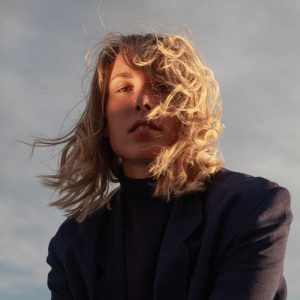Catapulted into streaming platforms on Feb. 28, 2020, the Blue album was scheduled to be performed on tour starting at the beginning of April. Instead, Rosie Valland is self-isolating at home, planting a garden.
 “The shows and the promotion stopped overnight,” she says. “It was really intense, and then my work schedule became completely empty… I never thought I’d be cleaning my yard and sowing seeds right now.”
“The shows and the promotion stopped overnight,” she says. “It was really intense, and then my work schedule became completely empty… I never thought I’d be cleaning my yard and sowing seeds right now.”
The telltale small gusts of wind that can be heard on her cellphone indicate that she’s somewhere out in the open. All interviews, of course, are conducted remotely in the time of pandemic. Valland takes the call from her plot of land in Rigaud, Québec, not far from La Blouse and the Québec-Ontario border. It’s a 50-minute drive from Montréal’s Cabaret Lion d’Or, the Francouvertes venue where she was discovered five years ago.
That many years have passed since the release of Partir avant, her second album, and best-known so far. That collection of songs, released on the Duprince label, introduced her to the general public, the industry, and most certainly to the press. “When I listen to Partir avant again,” she says, “I feel no regrets, but I feel much empathy towards the person who did that. Those were early songs, something rough, sketchy, and I don’t sense that I’d found myself yet.”
Without actually disowning « Olympe » and that album’s other songs, the singer-songwriter reckons that Blue was where her career actually began. She says she also took part in production then. This time around, she’s sharing this side of the work with Jesse Mac Cormack, her partner since the early days. It was really a 50-50 team.
“Although Blue’s life may be cut short by the pandemic, the album brought me a lot,” says Valland. “Before getting into it, I knew nothing about computer programs, and any of that. I allowed myself so much time to do it that I was able to learn how to record myself. I was already making a living from my music, but I now have more strings in my quiver. I feel that I’ll be able to grow old in that environment, because I’ll be able to do much more than my own individual projects in my own name.”
These days, actually, the new Rigaud resident is working under contract for the Télé-Québec platform La Fabrique culturelle. She’s been writing original music for every episode of Proxémie, a podcast exclusively featuring female artists, that’s being hosted by the actress Sophie Cadieux. The constraints of commissioned music are allowing her to explore brand new territory that stands far away from the pages of her diary.
“You create a mood,” she explains, “and, at the same time, it’s not permitted to dominate anything else. It’s a top-notch team, so I’m really happy to be doing this, particularly right now. I’m grateful to have this… It’s instrumental music, I’d never done that, and I’m finding my own way around as well.”
A second chance to make a first impression
Enhanced arrangements, crisp melodies, a less sad and whiskey-stained voice… The improvement was so great that Valland could almost have started singing under a new name. With Blue, the former Montréaler is sporting a new sound and entering another cycle.
“Automatically, it was folkier than before, because I was composing with what was around in my one-bedroom apartment, which was not much,” she says. “The songs may be somewhat richer because I can start with a beat, or a synth idea, instead of always from a guitar.”
Clearly inspired by 1990s pop rock (“it’s most like me”), the one-woman-band admits having indulged in a tribute to Smashing Pumpkins on “Chaos,” and in a few nods to the Céline Dion of the D’eux album.
“I’m so fond of her voices, the reverbs, the way she sings,” says Valland. “I have to laugh when my aunts and uncles write to me online and tell me that they ‘can’t make out what I’m saying.’ I feel like telling them, ‘Listen to a Céline song, and tell me if you can understand anything!’ You can’t hear a thing, and she doesn’t articulate either, there’s really something left out. Personally, I never understood the lyrics, and I don’t want to know. I only thought that it sounded like me, and the way I see my own voice. Like an instrument.”